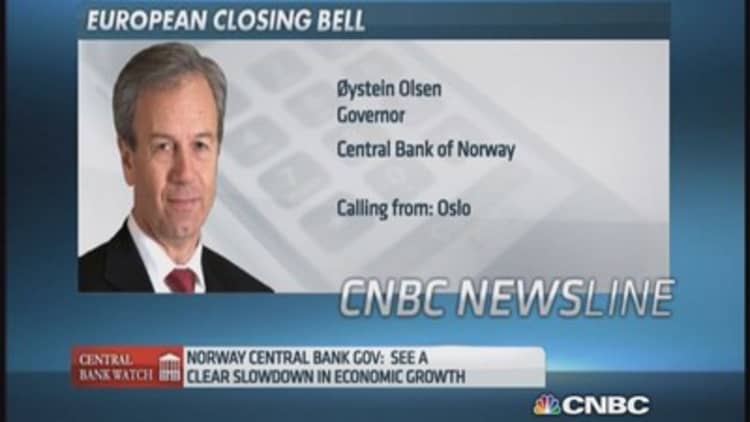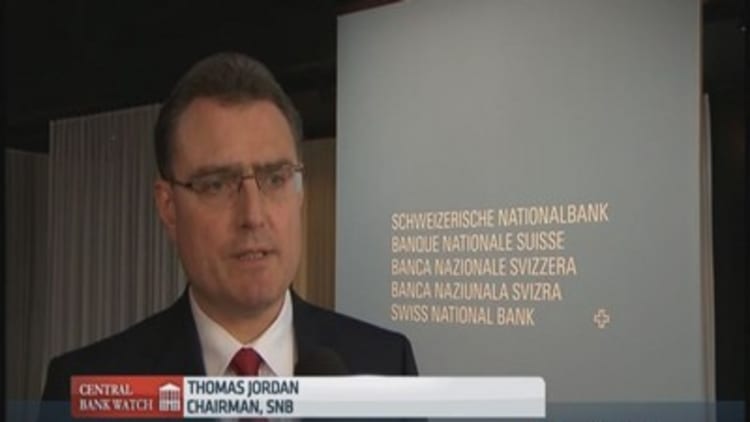
Norway's central bank cut interest rates in a surprise move Thursday to prop up an economy ailing from falling offshore investments, lower oil prices and weak growth in Europe.
"There is a clear slowdown, especially when we are looking forward," Central Bank Governor Oystein Olsen told CNBC after the decision.
The central bank cut its benchmark rate to 1.25 percent from 1.5 percent, defying analysts expectations for a steady rate and a promise of lower rates next year.
Read More Oil price fallout: Producers struggle as GDP grows
The Norwegian krone fell to a five-year low against the euro on the news.
"Growth prospects for the Norwegian economy have weakened," the bank said in a statement. "Activity in the petroleum industry is softening and the sharp fall in oil prices is likely to amplify this tendency."
"This will have spillover effects on the wider economy and unemployment may edge up ahead," it added.
Read MoreWhy rich Norway can't afford to be complacent
Olsen told CNBC there was a "50-50" chance of another interest rate cut during the first half of next year. The Norwegian central bank was an early adopter of "forward guidance."
Norway's growth prospects, already weighed down by falling oil investments, took a turn for the worse in recent months as oil prices tumbled 40 percent over the past six months and investments in the offshore petroleum sector could fall by 15 to 20 percent next year.
Olsen forecast oil prices would rebound, but not up to the $100 level seen before this past September.
The central bank now sees economic growth on mainland Norway, excluding the offshore oil and gas sector, at 1.5 percent next year, below earlier forecasts for 2.25 percent.
'Immediate' inflation hit from oil
Also Thursday, the Swiss National Bank opted to keep its interest rates unchanged. The bank held its target range for three-month Libor at 0.00-0.25 percent, as analysts polled by Reuters had expected.
In conversation with CNBC, Swiss Central Bank Chairman Thomas Jordan said falling oil prices had had "immediate impact" on inflation in Switzerland—which unlike Norway, is not an oil producer.
"It is extremely important that inflation expectations remain in positive territory," he told CNBC on Thursday.
Like its neighbors in the euro zone, Switzerland is grappling with disinflation and deflationary pressures. Consumer price inflation in Switzerland was flat for a second consecutive month in November.

Given these pressures, some analysts had forecast the bank would opt for negative interest rates, as introduced this year by the European Central Bank on its deposit facility.
Instead, the bank reiterated its commitment to defending the currency peg and to take further measures immediately if necessary.
In words reminiscent of ECB President Mario Draghi, Jordan said: "We will not exclude any other measure if necessary. ... We are not hesitant to introduce a negative deposit rate if necessary."
He added: "We have a very difficult environment and situation in Europe, which has also impacted on us. ... What is very important to us is that the euro zone growth improves over time."
Like Norway, Switzerland is part of neither the European Union nor the smaller 18-country single currency zone.
The Swiss franc rose to its highest in more than a week against the euro on the news that rates were unchanged. The euro fell to 1.2009 francs after the rate decision from around 1.2037 beforehand.
Jordan also told CNBC that he was relieved that a initiative to ban gold sales by the Swiss National Bank was rejected last month. The referendum on the issue received international media coverage.
Read MoreSupport for Swiss gold referendum proposal falls short

